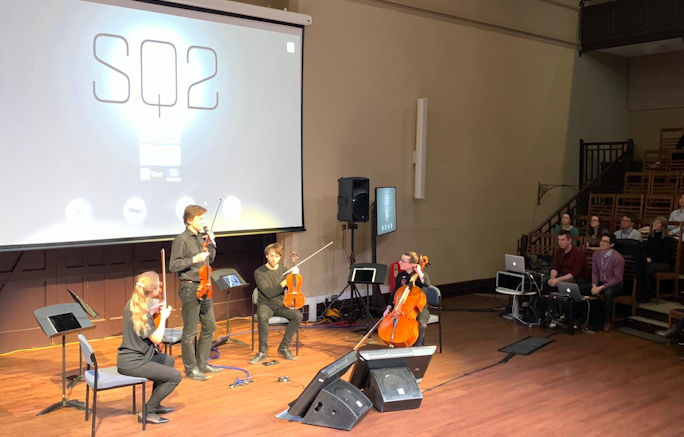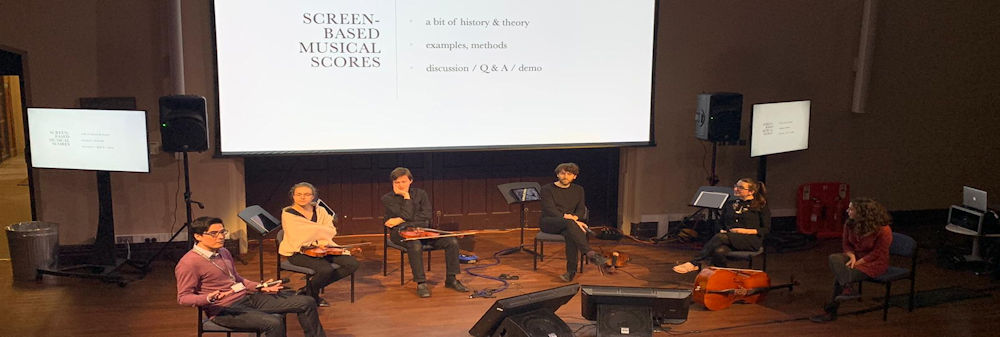We caught up with Dr Paul Turowski, composer, performer and Lecturer at the University of Liverpool to talk about his collaboration with The Ligeti Quartet, one of the UK’s leading contemporary ensembles working in the area of video and digital game-based music performance, and how he hopes the new Yoko Ono Lennon Centre, as well as creating opportunities for students, will take the Open Circuit series of concerts in an exciting new direction.
How did you come to work with The Ligeti Quartet?
I met The Ligeti Quartet through Professor Craig Vear at De Montfort University who put on a concert of screen-based scores where the Quartet performed. It included a piece that Simon Hutchinson and I wrote called Plurality Spring in which the players only have one microphone input but they’re all playing pitches that, depending on which pitch they play, move these little avatars around.
Simon and I saw the video for that and we were really happy with how they did not only our piece but the other screen-based pieces; it seemed like they were thinking about them really carefully and doing really interesting things musically, not just trying to play exactly what’s there. We thought it would be great to get them to come here and put on a concert.
In March this year we had a concert as part of Open Circuit festival which involved an open call for works with people from all over the world submitting pieces. The concert was called Interactive Traces, and this Lunchtime Concert was a reprise of a few pieces from March’s concert that specifically involved screen-based scores. There have been lots of works done with screen-based scores in the past and there’s a whole community of people interested in animated and game-based scores whose work I’m inspired by and have drawn from; people like Professor Cat Hope at Monash University and Lindsay Vickery at Edith Cowan University who published a paper on screen scores a few years ago that was pretty influential, and Ryan Ross Smith, who works with animated scores.
Screen Scores was recently performed as part of the Lunchtime Concert Series, featuring your piece SQ2. Can you tell me more about SQ2?
When you invite someone to a performance like this they may not have had any experience with game-based improvisation or animated scores, so one of the challenges is to design the score, which is this visual, live, interactive thing, in such a way that the relationships are really clear. We need to make sure the game is not a distraction and that it’s easy to understand.
Animated notation can serve to represent music in novel and intuitive ways. It could include standard musical notation, which people coming to a concert may be familiar with, but might also include new symbols and associations, like a letter referring to a pitch that is attached to an object in the game, as you saw with my piece SQ2. This kind of mapping might be more accessible for people who don’t read music, and the relationship between pitches is spatial and dynamic rather than fixed linear sequences.
Performers have a chance to rehearse the piece and practice it ahead of time but the audience also needs to understand how it works, so that’s why in SQ2 the first stage is just introducing the pitches. One coloured circle represents the pitch A, for example, and when the players play that particular pitch near that circle something happens. I’m hoping that came across but there’s definitely lots of room for improvement and further experimentation.

Will the new Yoko Ono Lennon Centre provide exciting new opportunities for performing pieces?
Absolutely. We’re really excited about this new space because it has state-of-the-art technology; it’s going to allow us to perform these screen-based scores more easily but also in a way that’s more effective. As I understand it the stage is going to be set up to have all sorts of data access points, so it will be easy to configure complex set-ups that involve moving around in the space, interacting with multiple screens as well as having a state-of-the-art sound system. In the Leggate Theatre, which is a beautiful space, every time we put on a concert there we have to bring all the equipment over from the Music department. The space is really great for acoustic sounds but is not ideal for electronics. It can be difficult to balance acoustic and electronic sounds in the Leggate, whereas this new space is going to be designed for both and will allow us to imagine works in a new way. Having a dedicated space just for concerts where we don’t have to compete with teaching or other events will be great too.
What opportunities will there be for students to present their work in the new space?
Open Circuit regularly has at least one if not more concerts just devoted to student work. Dr. Oli Carman usually puts on a concert of electro-acoustic music that includes work that’s been in done in modules that he teaches. We’re looking to include more students from the University but also if we’re able to put on more concerts as part of Open Circuit we can then put out more calls for works to bring in people from nearby areas like Manchester or from around the UK.
Can you tell me more about the University’s new interdisciplinary undergraduate programme in Game Design Studies?
Game Design Studies is in two parts; the critical analysis side involves thinking about games from sociological, critical and ethical standpoints. The other part is more practical and in the first year involves students thinking about the design process and looking at critical texts. In the second year they choose a pathway, for example music, in which they would start to develop a portfolio of compositions which culminates with an independent project. In the third year there’s a year-long group-based project.
The programme enhances their musical experience by providing them context about how games are made, how they influence our behaviour, and how the games industry works; what it doesn’t do is provide that computer science knowledge to actually create games out of code. That’s part of the single honours programme we’re building now.
Liverpool is leading the way in terms of game studies, particularly around experimental uses of game technology for creative purposes. I haven’t really seen it much in the UK. Apart from Southampton, we’re the only other Russell Group university that offers a provision in games design. I feel proud that we’re able to offer the Russell Group experience along with game design, and that we’re one of the few that do it.
And finally, do you have a favourite piece of music?
That’s really difficult! I suppose the first thing to pop into my head is Messiaen’s Quartet for the End of Time. I come back to that piece once in a while and am always blown away by it but I’m not always in the mood for listening to it. But I guess if I had to choose one it might be that one.
We're really excited about this new space because it has state-of-the-art technology...and will allow us to imagine works in a new way
Dr Paul Turowski
Back to: Yoko Ono Lennon Centre
